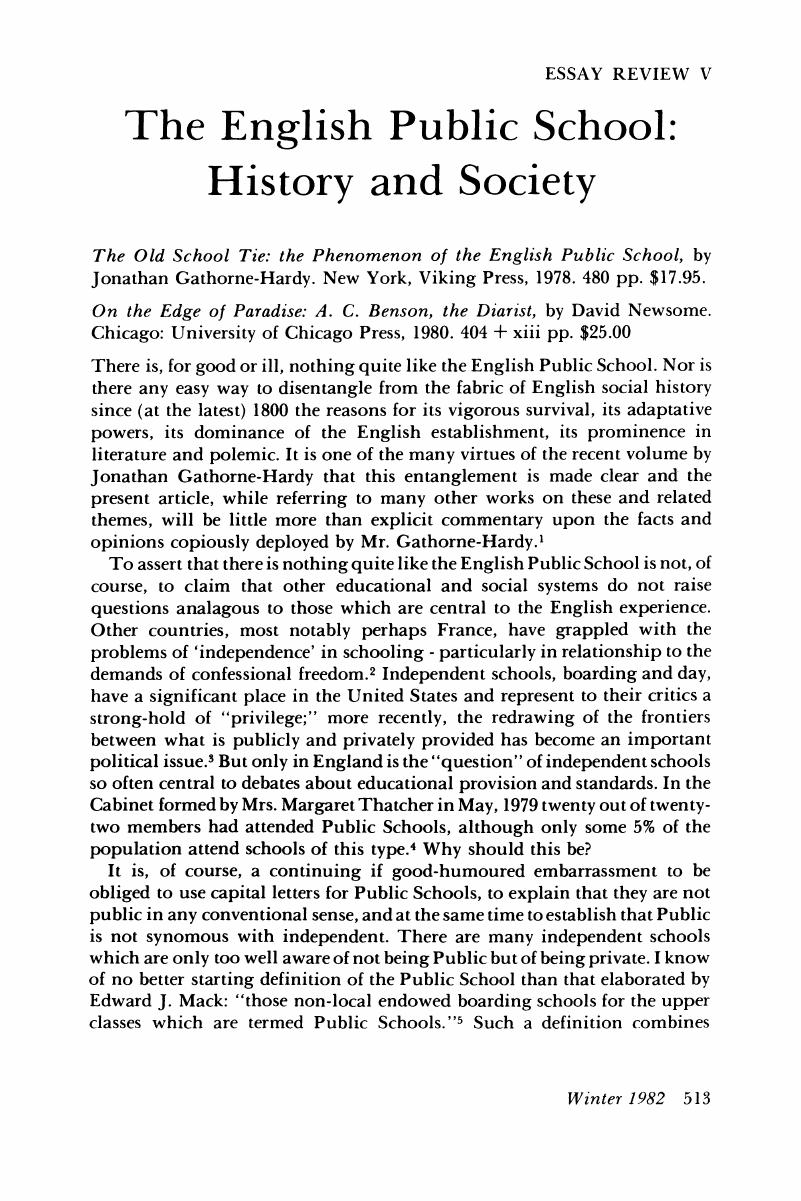Published online by Cambridge University Press: 24 February 2017

1. Gathorne-Hardy, Jonathan, The Old School Tie: the Phenomenon of the English Public School. Viking Press, New York, 1978. Published in England in 1977 under the title The Public School Phenomenon, Lond. 597–1977. References in later footnotes will be to the American edition. Other references, unless the exception is noted, will be to the first English edition of the work cited.Google Scholar
2. Halls, W. D., Education, Culture and Politics in Modern France, Oxford, 1976: p. 9.Google Scholar
3. See, for example, Coons, John E. and Sugarman, Stephen D., Education by Choice (Berkeley, California, 1978).Google Scholar
4. Butler, David and Sloman, Anne, British Political Facts 1900–1979, London, Fifth Edition. Pub. 1980.Google Scholar
5. Mack, Edward J., Public Schools and British Opinion, 1780–1860, London. 1938, p. xi.Google Scholar
6. Leach, A. F., Schools of Medieval England, London, 1915.Google Scholar
7. Gathorne-Hardy, , The Old School Tie, New York, 1948.Google Scholar
8. See, most recently, Hurt, J. S., Elementary Schooling and the Working Class, London, 1979.Google Scholar
9. On the Act of 1902 and the circumstances surrounding so spectacularly late an intervention by the Government, see especially Eaglesham, E. J. R., The Foundations of Twentieth Century Education in England, London, 1967.Google Scholar
10. Strachey, Lytton, Eminent Victorians, London, 1918. Stanley, A. P., The Life and Correspondence of Thomas Arnold, London, 1845, or London, 1971. Arnold, Matthew, Rugby Chapel, in New Poems, London, 1867. Hughes, Thomas, Tom Brown's Schooldays, London, 1857.Google Scholar
11. Bamford, T. W., Thomas Arnold, London, 1960, and The Rise of the Public Schools, London, 1967.Google Scholar
12. Percival, Alicia C., Very Superior Men, London, 1973.Google Scholar
13. Newsome, David, Godliness and Good Learning, London, 1961.Google Scholar
14. Ibid, p. 227.Google Scholar
15. Ibid, p. 201.Google Scholar
16. Newsome, David, On the Edge of Paradise. A. C. Benson: the Diarist, Chicago, 1980.Google Scholar
17. ed. Newsome, David, Edwardian Excursions: from the diary of A. C. Benson. London, 1981.Google Scholar
18. On the Edge of Paradise, p. 167. See 16.Google Scholar
19. Ibid, pp. 80–81.Google Scholar
20. Farrar, A. W., Eric, or Little by Little, 1858 (latest edition, 1971) London. Grosskurth, Phyllis, The Woeful Victorian, 1965.Google Scholar
21. On the Edge of Paradise, p. 68. See 16.Google Scholar
22. Ibid, p. 69.Google Scholar
23. Gathorne-Hardy, , p. 97.Google Scholar
24. Maughan, Robin, Escape from the Shadows, London, 1973. Lambert, Royston, The Hothouse Society, London, 1968.Google Scholar
25. Cited in Kalton, Graham, The Public Schools: a Factual Survey, London, 1966. See also Lambert, Royston, A Manual to the Sociology of the School, London, 1970.Google Scholar
26. Waugh, Alec, The Early Years, London, 1963. A similar spirit can be observed in many of the essays edited by Graham Greene in The Old School, London, 1934.Google Scholar
27. Banks, Olive, Parity and Prestige in British Secondary Education, London, 1955.CrossRefGoogle Scholar
28. Orwell, George, Boys Weeklies' from Inside the Whale , 1940. London, 1969.Google Scholar
29. Barnett, Correlli, The Collapse of British Power, London, 1972.Google Scholar
30. Kamm, Josephine, Hope Deferred—Girls Education in English History, London, 1965. Stewart, W. A. C., Progressives and Radicals in English Education, London 1750–1950, 1972.Google Scholar
31. Barker, Rodney, Education and Politics 1900–1951, Oxford, 1972, especially chapter VI.Google Scholar
32. Crosland, A. R., The Future of Socialism, London, 1956, pp.196–207. He argued that a Labour Government should not touch the (maintained and selective) Grammar Schools until the Public School problem had first been solved. He did the opposite.Google Scholar
33. Department of Education and Science, HMSO, The Public School Commission, First Report, London, 1968. See also Crossman, R. H. S., Diaries of a Cabinet Minister, Vol. I, 1975, London p. 279. Astonishingly, Mr. Gathorne-Hardy makes no reference to this Commission.Google Scholar
34. Wilson, J. B., Public Schools and Private Practice, London, 1962. Snow, George, The Public School in the New Age, London, 1959. Dancy, J. C., The Public Schools and the Future, London, 1965. Halsey, A. H., Heath, A. F. and Ridge, J. M., Origins and Destinations, Oxford, 1980, especially p. 172.Google Scholar
35. Rae, John, The Public School Revolution: Britain's Independent Schools 1964–1979, London, 1981.Google Scholar
36. The Chairman of the Public Schools Commission for 1965, sometime Chief Education Officer for Hertfordshire, and Chairman of the Central Advisory Council for Education.Google Scholar
37. Rae, John, The Public School Revolution, pp. 16, 17.Google Scholar
38. Ibid, p. 28.Google Scholar
39. Ibid, p. 185.Google Scholar
40. Gathorne-Hardy, , p. 372.Google Scholar
41. quoted in Newsome, David, Godliness and Good Learning, 1961, p. 220. See 13.Google Scholar